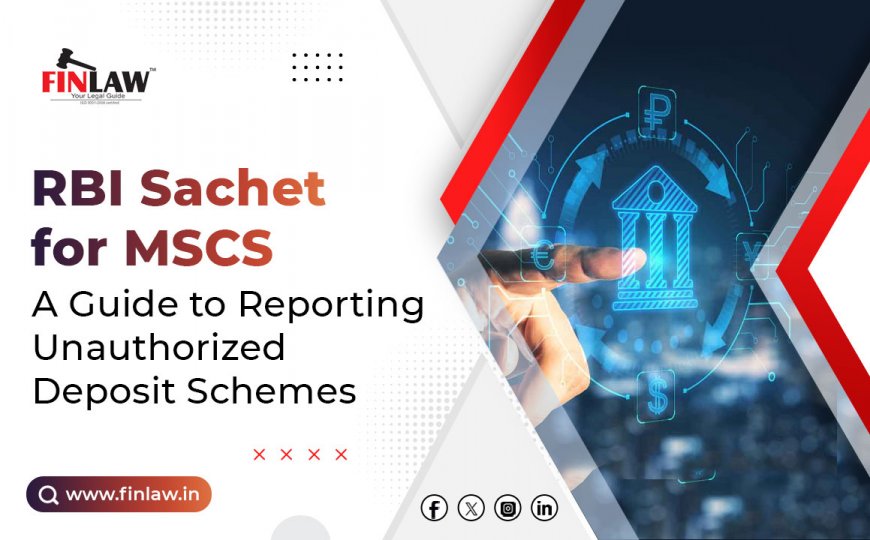RBI Sachet for MSCS: A Guide to Reporting Unauthorized Deposit Schemes
Learn how to use RBI Sachet for MSCS to report unauthorized deposit schemes in India. Protect your investments and stay informed with this guide.

In recent years, India has witnessed a surge in unauthorized deposit schemes, leading to significant financial losses for unsuspecting investors. To combat this menace, the Reserve Bank of India (RBI) introduced the RBI Sachet for MSCS—a dedicated platform for reporting illicit deposit activities, especially those involving Multi-State Cooperative Societies (MSCS). This article delves into the functionalities of the RBI Sachet portal, the implications of the Banning of Unregulated Deposit Schemes Act, 2019, and the role of MSCS in this context.
What is RBI Sachet for MSCS?
RBI Sachet for MSCS is a specialized initiative under the RBI Sachet portal established by the Reserve Bank of India to educate the public about unauthorized deposit schemes and enable the swift reporting of any suspicious financial activities related to MSCS. The name 'Sachet' translates to 'alert' in Hindi, emphasizing its purpose to keep the public vigilant and informed. The portal acts as a bridge between the general public and regulatory authorities to curb fraudulent financial practices.
Key Features of RBI Sachet for MSCS
-
Information Dissemination: Provides verified information on MSCS authorized to accept deposits in India.
-
Complaint Registration: Enables the public to report unauthorized deposit schemes linked to MSCS swiftly.
-
Regulatory Coordination: Facilitates seamless communication between various regulatory bodies like SEBI, IRDAI, state governments, and the Central Registrar of Cooperative Societies.
-
Public Awareness: Offers resources to educate the public on identifying and avoiding potential frauds by MSCS.
Understanding Unauthorized Deposit Schemes
Unauthorized deposit schemes are financial arrangements that operate without regulatory approval, often promising high returns with minimal risk. These schemes exploit regulatory gaps and prey on the public's desire for quick profits, leading to substantial financial losses. The proliferation of such schemes necessitated a robust legal framework to protect investors.
The Banning of Unregulated Deposit Schemes Act, 2019
Enacted in July 2019, the Banning of Unregulated Deposit Schemes Act aims to prohibit unregulated deposit schemes and safeguard the interests of depositors. Key provisions of the Act include:
-
Definition of Deposits: The Act defines a deposit as any receipt of money with a promise to return it, either with or without interest, after a specified period or upon demand.
-
Prohibition of Unregulated Schemes: It bans all deposit schemes not registered with the appropriate regulatory authorities, thereby criminalizing unauthorized deposit-taking activities.
-
Offenses and Penalties: The Act categorizes offenses such as running unregulated deposit schemes, fraudulent default in regulated schemes, and wrongful inducement in relation to unregulated schemes, prescribing stringent penalties for violators.
Role of Multi-State Cooperative Societies (MSCS)
Multi-State Cooperative Societies operate across multiple states under the Multi-State Cooperative Societies Act, 2002. While many MSCS function legitimately, some have been implicated in unauthorized deposit-taking activities. The RBI Sachet for MSCS serves as a crucial tool to report such violations and safeguard public interest.
MSCS and Public Deposits: Key Considerations
-
Regulatory Compliance: MSCS must register with the Central Registrar of Cooperative Societies to operate legally.
-
Deposit Schemes: MSCS can only accept deposits from their members and cannot solicit public deposits.
-
Legal Recourse: If an MSCS is found engaging in unauthorized deposit-taking, it may face penalties under the Banning of Unregulated Deposit Schemes Act.
How to Report Unauthorized Deposit Schemes Involving MSCS
If you suspect a Multi-State Cooperative Society of operating an unauthorized deposit scheme, the RBI Sachet for MSCS portal provides a streamlined process for reporting:
-
Access the Sachet Portal: Visit the official website at https://sachet.rbi.org.in.
-
Navigate to 'Help Your Regulator': This section allows you to share information regarding any unauthorized acceptance of deposits.
-
Provide Details: Fill in the required information about the suspicious MSCS, including its name, address, and details of the unauthorized scheme.
-
Submit the Complaint: After providing all necessary details, submit your complaint. The information will be shared with the concerned regulator or law enforcement authority for necessary action.
Benefits of Using the RBI Sachet for MSCS
-
Transparency: Users can verify the legitimacy of MSCS before investing, reducing the risk of falling prey to fraudulent schemes.
-
Efficiency: The portal facilitates swift reporting and tracking of complaints, ensuring timely intervention by regulatory authorities.
-
Awareness: By providing information on authorized MSCS, the portal educates the public, fostering a more informed investor community.
Investor Awareness and Precautions
While regulatory bodies work tirelessly to curb unauthorized deposit schemes, investor vigilance remains paramount. Before investing, individuals should:
-
Verify Legitimacy: Use the RBI Sachet for MSCS portal to check if the MSCS is registered and authorized to accept deposits.
-
Be Skeptical of High Returns: Exercise caution with schemes promising unusually high returns with minimal risk, as they may be indicative of fraudulent activities.
-
Seek Professional Advice: Consult financial advisors or conduct thorough research before committing funds to any investment scheme.
Conclusion
The RBI Sachet for MSCS, in conjunction with the Banning of Unregulated Deposit Schemes Act, 2019, represents a significant stride toward protecting investors from fraudulent deposit schemes by MSCS. By leveraging these tools and remaining vigilant, the public can play a crucial role in identifying and reporting unauthorized deposit activities, thereby contributing to a more secure financial environment in India.
What's Your Reaction?



















